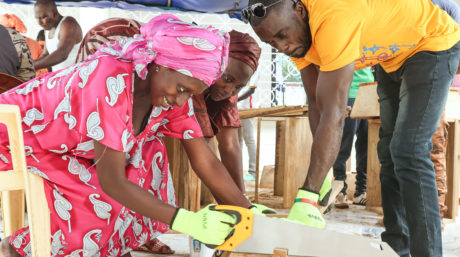
Major support from 120 beehives: Wetlands International Africa strengthens the beekeeping sector in Casamance
From 23 to 27 September 2024, Wetlands International West Coast Africa and Gulf of Guinea (WIACO) organized a training session on modern beekeeping for six (6) groups from four protected areas in the Ziguinchor region. These areas include the Marine Protected Areas (MPAs) Ufoyal Kassa Bandial, Kaalolal Blouf Fogni, Kassa Balantacounda, Niamone Kalounayes, as well as the Kawawana Indigenous Community Heritage Area and Territory (ICAP). This initiative aims to integrate modern beekeeping techniques into local activities, while contributing to the sustainability of ecosystems, particularly through the preservation of mangroves.

The main objective of this training was to introduce participants to modern beekeeping practices, while providing them with the necessary tools to establish themselves sustainably in this sector. At the end of the training, the 20 participants were able to build and equip 120 hives. They also received professional equipment, including beekeeping outfits, smokers, safety boots, and other specialized equipment, distributed among the six groups. This achievement is a notable feat, both in terms of the quantity and quality of the equipment deployed.

The training combined practical modules, such as hive construction, with theoretical sessions on bee ecology and apiary management. Beyond skills building, this initiative lays the foundation for creating a structured and sustainable beekeeping sector that generates income for local communities. In Casamance, where coastal and island ecosystems are closely linked to mangroves, modern beekeeping represents an activity with high potential. Mangrove honey, particularly prized for its many benefits, is in high demand, making this production a substantial source of income for producers.

Samba Seydi, a beneficiary from the commune of Niaguis, testifies: “I can confidently say that I am now ready for beekeeping entrepreneurship. This training provided me not only with theoretical and practical knowledge, but also with the necessary equipment to successfully launch this business.” In addition to its economic benefits, beekeeping plays a key role in mangrove preservation. “The bee is an essential agent of pollination and thus contributes to the maintenance and regeneration of mangrove ecosystems,” explains Mamadou Bakhoum, expert trainer in modern beekeeping and facilitator of the session.
Wetlands International Africa’s intervention in Casamance is part of a sustainable development approach, integrating both the conservation of natural ecosystems and the promotion of income-generating activities for local communities. Modern beekeeping, as an emerging sector, has an important role to play in this balance between economic development and environmental preservation.
This activity was carried out as part of the Rooted Resilience project, funded by the Swedish Postcode Lottery Foundation, and Mangrove Capital Africa, funded by DOB ECOLOGY.

